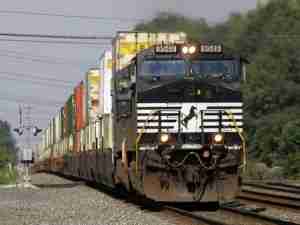Quebec rail disaster shines critical light on oil-by-rail boom
posted by AJOT | Jul 07 2013 at 08:00 PM | Intermodal
The deadly train derailment in Quebec this weekend is set to bring intense scrutiny to the dramatic growth in North America of shipping crude oil by rail, a century-old practice unexpectedly revived by the surge in shale oil production.
At least five people were killed, and another 40 are missing, after a train carrying 73 tank cars of North Dakota crude rolled driverless down a hill into the heart of Lac-Megantic, Quebec, where it derailed and exploded, leveling the town center.
It was the latest and most deadly in a series of high-profile accidents involving crude oil shipments on North America's rail network. Oil by rail - at least until now - has widely been expected to continue growing as shale oil output races ahead far faster than new pipelines can be built.
Hauling some 50,000 barrels of crude, the train was one of around 10 such shipments a month now crossing Maine, a route that allows oil producers in North Dakota to get cheaper domestic crude to coastal refiners. Across North America, oil by rail traffic has more than doubled since 2011; in Maine, such shipments were unheard of two years ago.
"The frequency of the number of incidents that have occurred raises legitimate questions that the industry and government need to look at," said Jim Hall, managing partner of consultants Hall & Associates LLC, and a former chairman of the U.S. National Transportation Safety Board.
"The issue here is: are they expanding too rapidly?" he said. "Are they in a rush to accommodate and to make the economic advantage of carrying these?"
Much at Stake
There are many unanswered questions about the Quebec disaster that will likely shape the public and regulatory response, including why a parked freight train suddenly began rolling again, and why carloads of crude oil - a highly flammable but not typically explosive substance - caused such widespread disaster.
"There may have been some vapors, maybe? I don't know. We don't know exactly what happened," Edward A Burkhardt, chairman of Montreal, Maine & Atlantic Railway, said in an interview on Saturday when asked about why the tankers may have exploded.
Apart from the human toll, the disaster will draw more attention to environmental risks of transporting oil.
Much is at stake: Oil by rail represents a small but important new source of revenue for big operators like Canadian Pacific Railway Ltd and Warren Buffett's BNSF, which have suffered a drop in coal cargo. It is also a flexible and cheaper option to more expensive European or African crude for refiners like Irving Oil, which confirmed on Sunday that the train was destined for its 300,000 bpd plant in Saint John, New Brunswick.
And for producers like Continental Resources Inc which have pioneered the development of the Bakken fields in North Dakota, railways now carry three-quarters of their production; new pipelines that can accommodate more oil are years away.
Saturday's train wreck may also play into the rancorous debate over the $5.3 billion Keystone XL pipeline from Canada to the U.S. Midwest, which is hinging on President Barack Obama's decision later this year.
Obama said last month that approval for the line would ultimately depend on its impact on carbon-dioxide emissions. An earlier draft report from the State Department suggested that rejecting the project would not affect emissions because crude would still be shipped by rail.
As a result, the incident may strengthen the resolve of those opposed to the Keystone pipeline rather than soften resistance. The oil industry at large is already broadly supportive of both rail and pipeline transport.
"Committed critics ... could conceivably seize upon the Lac-Megantic incident - in tandem with recent pipeline spills - to argue against oil production, irrespective of its mode of transport," said Kevin Book, managing director of Research at ClearView Energy Partners.
Move it by Rail
The railway industry has







